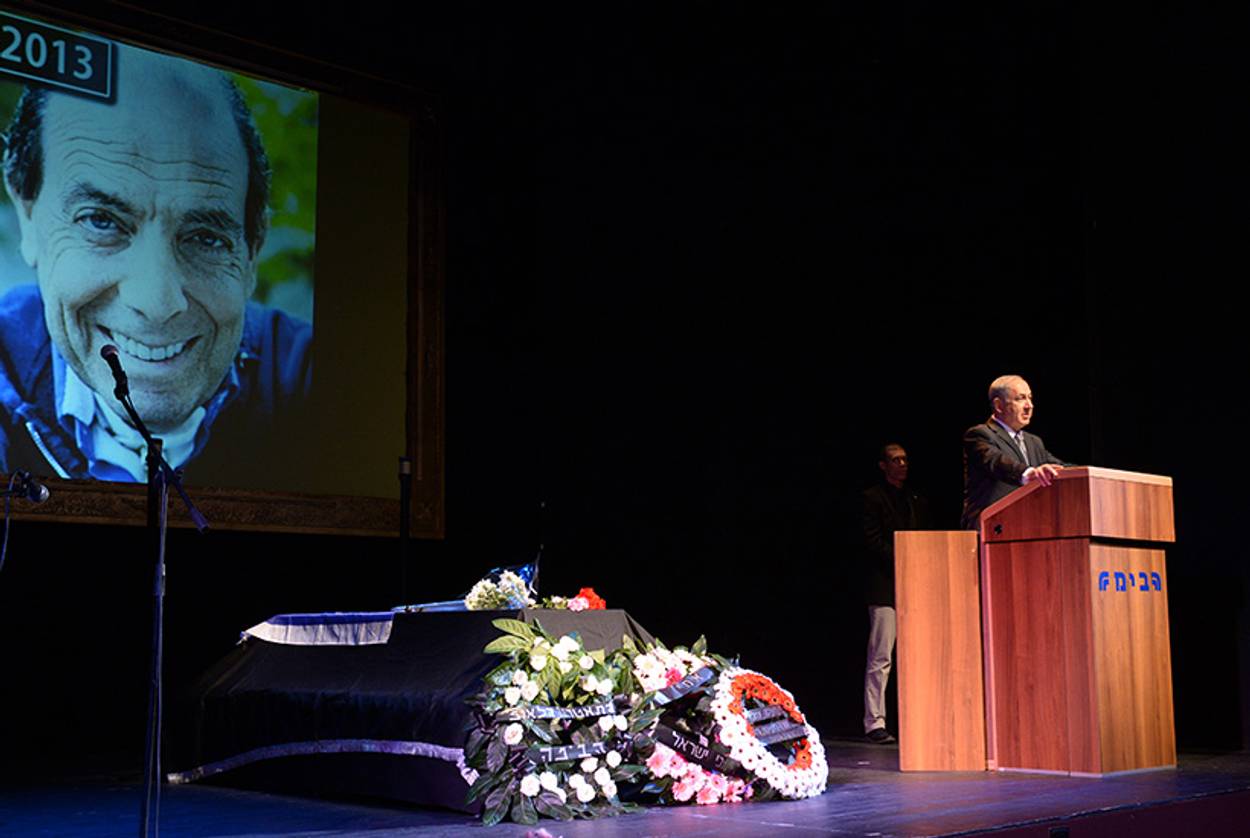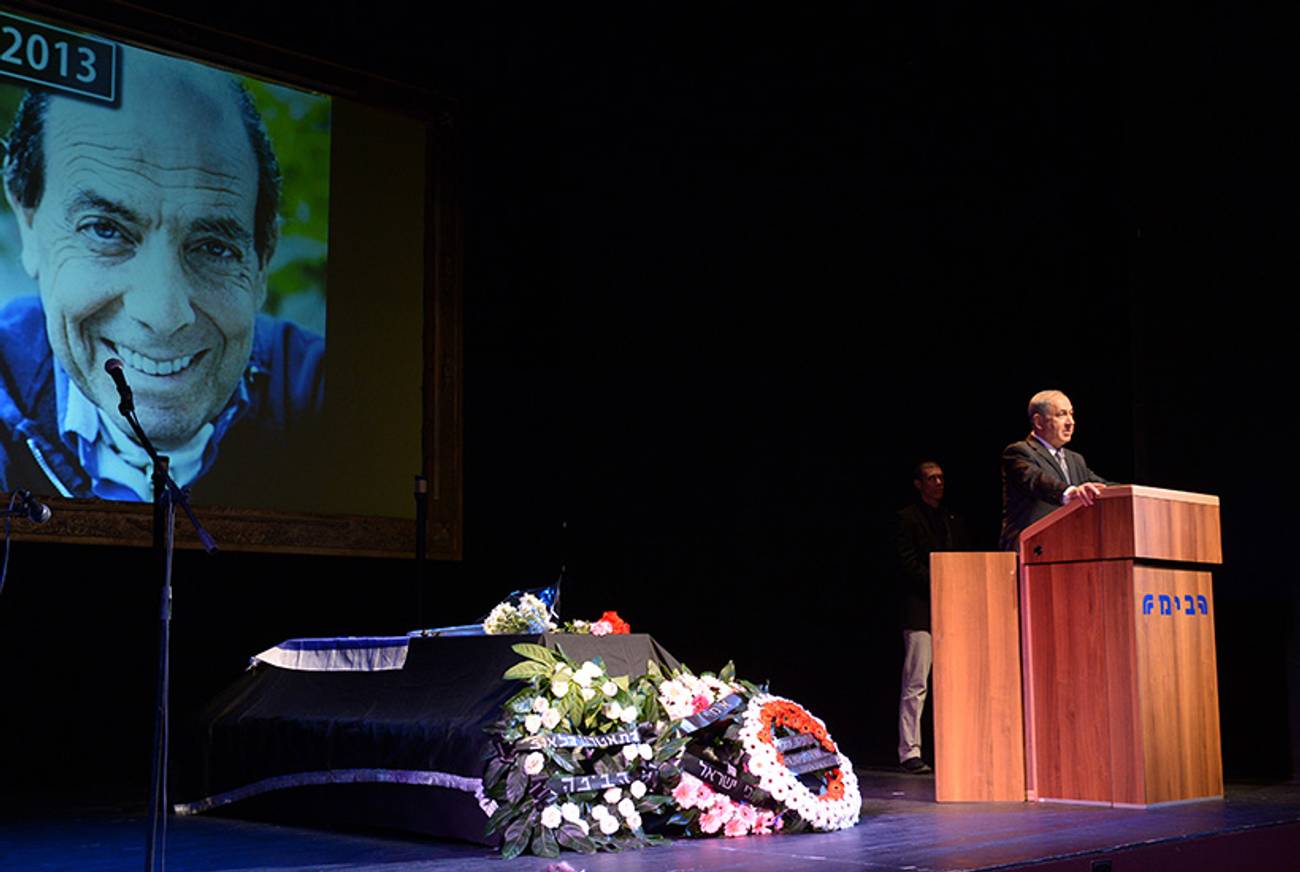An Appreciation for the Man Who Killed Shimon Peres’ Career
Sefi Rivlin, the iconic Israeli comedian who died earlier this month, revolutionized the country’s political scene




Sefi Rivlin always had lousy timing. Which, for a comedian, is a bit of a challenge. Never, mind you, on screen or on stage: There, Rivlin’s skill was so great that he starred in the Israeli adaptations for both All in the Family—as Itche Schulman, the local bigoted soul brother of Archie Bunker—and Mr. Bean, as Sefi, an overgrown baby who stumbles hilariously as he tries to complete the most mundane tasks. To realize how difficult a comedic undertaking that is, try to imagine Carroll O’Connor attempting Bean’s brand of wordless, physical comedy, or Rowan Atkinson sitting on Archie’s favorite recliner and dispensing some of his high-octane invective. Rivlin excelled at both.
Offstage was a different story, one best told backward: Rivlin passed away earlier this month, just a few days after Arik Einstein, the icon of Israeli music, and while the nation mourned its most beloved singer, few noticed that the comedian, also enormously popular, wasted away, consumed by the cancer that had gnawed at him since 2006.
Even if Rivlin’s demise had come at a less-crowded moment, however, it’s unlikely that he would have received a unanimous requiem. While singularly talented—with one exception, soon to be discussed, Rivlin stands alone in the sparsely populated pantheon of Israeli comedy—he had grown political early on in his career, using his wit and intensity as a spokesman of the Likud party and alienating many fans and friends, including most in the country’s traditionally liberal milieu of artists and entertainers.
He started out strong. In 1975, on the recommendation of a friend, Rivlin, then 28, joined the cast of Nikui Rosh, a massively influential satirical show on Israel’s then-only channel—dubbed, not without a touch of irony, Channel 1. How influential was the show? It toyed around with incredibly subversive stuff, like a skit in which a comedian imitating then-president Ephraim Katzir admits that the Jewish state had a nuclear arsenal; it was frequently the target of censorship attempts; and when it finally succumbed to public pressure, stepping off the air after only two seasons, it was immediately awarded the Israel Prize, the nation’s greatest honor.
Rivlin was only a member of the cast for one year, but his handful of appearances were enough to suggest to anyone paying attention that the small, wiry man was the next big thing. He was tapped for a recurrent role in Rega im Dodly, the premiere children’s show at that time, creating the character of Fistuk, Hebrew for Pistachio, a man-child in a striped shirt and a hobo hat who approaches life with equal parts frustration and wonderment. He soon eclipsed the show’s other stars, was rewarded with his own spin-off, and continued to cultivate Fistuk into a character so seminal that, more than three decades later, it was voted by viewers to be the most beloved in the annals of Channel 1.
By the early 1980s, then, Rivlin was in full bloom. Many of the single channel’s shows came knocking, and Rivlin graced each one with his impeccable delivery, creating a gallery of memorable screwballs. He made two movies. He pursued a host of theatrical projects, showing a surprising aptitude for dramatic roles. But his mind was set on more serious matters, and as elections loomed in 1981 he approached the Likud and offered himself up as the party’s spokesman. It was an unprecedented move. Television had not been used seriously as a tool for political campaigning in Israel until 1977, and even then ads consisted mostly of charmless politicians reciting canned speeches. Rivlin wanted to upend all of that. He believed there was no reason for partisan spots to be any less entertaining than Fistuk. And he fiercely believed in Menachem Begin, Likud’s leader, then nearing the end of his first term after pulling off a historical upset and ending three decades of Labor dominance.
Begin won reelection. How much of the credit was due to Rivlin is impossible to tell, but the captains of the vanquished Labor weren’t taking any chances. As the next election cycle rolled in three years later, they turned to the only comedic act more revered than the hard-core, fast-talking Likudnik, the legendary trio known as Ha’Gashash Ha’Hiver. The Gashashim, as they are known, were so influential that they shaped not only the culture but the language itself, remaking modern Hebrew with their evocative lingo and becoming an indelible part of the fabric of Israeli life. They brought their linguistic flair to their political work, too, creating a series of skits that were not that different from their usual fare and that criticized the Likud’s ineptitude with a string of puns and with gusto.
But Rivlin was far more canny. Returning as the face of Likud in 1984, he realized that the party was facing a nearly certain electoral defeat and that the only way to avert disaster was by reducing the opponents to rubble. Insisting that he write all his own material—a feat not attempted before or since by entertainers enlisted by political parties—he began by good-humoredly acknowledging that the Gashashim were his dear friends. Then, unleashing all of the scorn and pent-up rage that are the twin engines of every comic worth his or her while, he zeroed in on his target. And his target was Labor’s leader, Shimon Peres.
By 1984, Peres was ready to take what many Israelis assumed was his natural seat in the prime minister’s chair. He’d held the helm briefly for two months in 1977, following Yitzhak Rabin’s abrupt resignation on the heels of a financial scandal, and had served as minister of just about everything. He wasn’t necessarily loved—Israelis largely suspected him of being a smooth operator, a career politician who’d compromise his principles for votes—but he was trusted enough to be a good custodian.
And then came Rivlin. Impeccably observant, he understood that the basic apprehension people felt about the slick-haired Labor leader was a comic’s goldmine. To amplify the charge of Peres’ duplicity, he came up with a catchphrase: ken ve’lo, yes and no. Dressed in a simple shirt, illuminated by a drab blue background, Rivlin produced political bits that were feats of verbal savagery. He’d ask questions about security, the economy, and other pertinent policy issues, and then a recorded voice, imitating Peres, would respond with ken ve’lo, like a call-and-response session in a church or a political rally. It had rhythm, it had resonance, and it was enough to devastate Peres: Against most predictions, the Likud again emerged triumphant, winning 48 seats in the Knesset, one more than Labor.
Rivlin’s political ingenuity, however, did not translate into public admiration. While the Gashashim were somehow forgiven for their political peccadilloes and allowed to reclaim their spot as the nation’s darlings, Rivlin was held accountable for his electoral actions. He was still popular, but he was another kind of popular, an entertainer many now loved despite his opinions. Things grew grimmer when the 1980s gave way to the 1990s, and Rivlin’s nemesis, Peres, returned alongside Rabin to usher in the Oslo peace process. The same year Peres, Rabin, and Arafat met on the White House’s lawn to sign their historical treaty, Rivlin felt his vocal cords giving in. He could speak only with difficulty now, and sometimes not at all. He stopped doing theater altogether. The future did not look promising.
The rise of commercial television in Israel changed all that. The 1990s were a time of deregulation, bringing about an influx of new channels and a torrent of content productions that clamored for talent of Rivlin’s caliber. And commercial TV paid well, which allowed him to focus on fewer projects and lead a less-hectic career. Judged by the cold metrics of salaries, ratings, etc., Rivlin was more popular than ever. But he was now perceived as part of the disposable popular culture, nothing close to the universally admired artist he had once seemed slated to become.
Seeking solace in politics again, Rivlin was elected to the city council of his home town, Rishon Le’Tzion, serving several terms. In 2008, he tried to run for the Knesset as a member of the Likud, but was crushed in the primaries by far better-oiled political machines. Cutting political ads, he learned, even very influential ones, was nothing like criss-crossing the country, speaking at local rallies, making deals.
It was just as well: In 2006, Rivlin was diagnosed with throat cancer, which, as the decade came to a close, seemed to get progressively worse. The doctors recommended surgery that would remove Rivlin’s vocal cords. He refused, not able to imagine life without his chief instrument. He traveled to Boston and underwent experimental medical procedures there. They failed. By 2012, he had no choice but to lose his voice.
That didn’t stop him from making one last iconic political television ad, considered one of the seminal moments of Israel’s most recent electoral campaign this year. In it, a sad piano tune comes up as nothing but a photo of the young Rivlin is displayed. “Even though I lost my voice,” read a series of cue cards written in Rivlin’s own hand, “something in me must shout out. I asked to appeal to you today and say: Take care of Israel! Vote for the one man who can truly safeguard Israel, Benjamin Netanyahu.”
Less than a year later, Rivlin succumbed to his illness. Netanyahu delivered a heartfelt eulogy, but most of Israel was too busy grieving for Arik Einstein. It was just the sort of grim yet somehow inherently funny situation—one celebrity death eclipsing another—that Fistuk, or any other of Rivlin’s characters, would have turned to comedy gold. But, Rivlin, sadly, was gone.
***
Like this article? Sign up for our Daily Digest to get Tablet Magazine’s new content in your inbox each morning.
Liel Leibovitz is a senior writer for Tablet Magazine and a host of the Unorthodox podcast.
Liel Leibovitz is editor-at-large for Tablet Magazine and a host of its weekly culture podcast Unorthodox and daily Talmud podcast Take One. He is the editor of Zionism: The Tablet Guide.